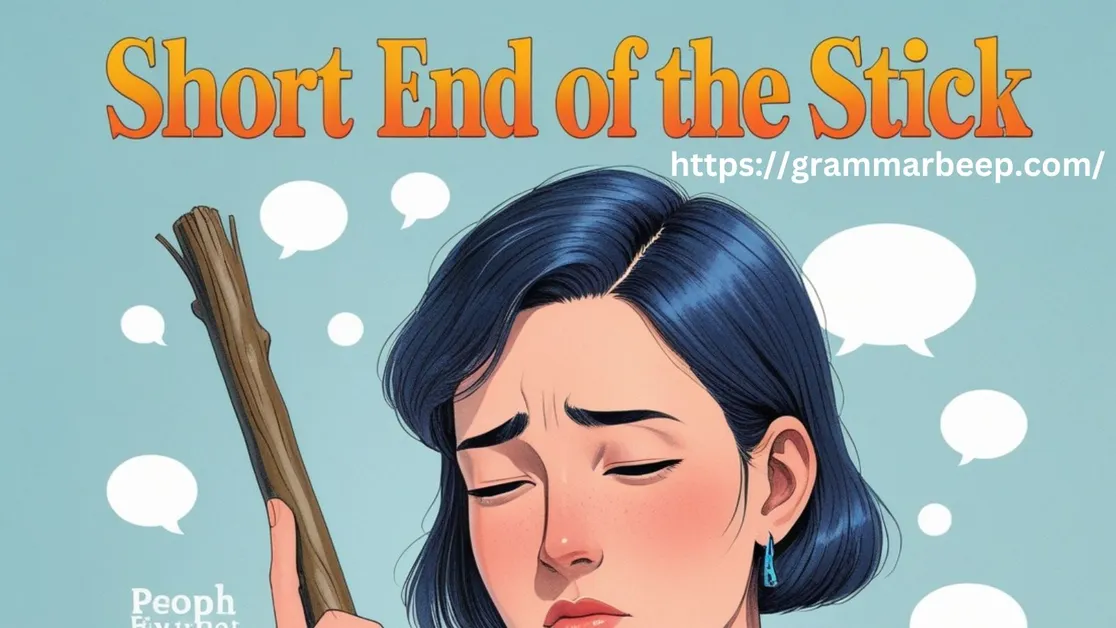20 Other Ways to Say “Short End of the Stick” dives deep into the colorful ways language captures life’s unfair moments. Everyone faces adversity or feels like they’re getting a raw deal at some point. Expressing these experiences vividly helps us connect, empathize, and share our stories more powerfully. This article offers fresh conversation expressions and relatable examples that bring each phrase to life.
Whether you’re crafting emails, writing blogs, or engaging in empathetic conversations, knowing these alternatives enriches your vocabulary. These phrases reflect the ups and downs shaped by random chance, social dynamics, and the realities of unfair treatment.
Landing on the Rough Side of the Mountain
When Jenna experienced the recent work reorganization, she quickly realized she was landing on the rough side of the mountain. Her workload doubled, while others seemed to have a lighter load.
Example Email:
Subject: Feeling Overwhelmed After Reorganization
Hi Mark,
Since the reorganization, I feel like I’m landing on the rough side of the mountain with the new responsibilities. I wanted to discuss ways to balance the tasks better. Thanks for your understanding.
Best,
Jenna
This phrase highlights adversity when someone faces more challenges than others in a comparable situation.
Drawing the Unlucky Card
Sometimes, life feels like a game of chance. After battling one health issue after another, Mike described his year as drawing the unlucky card.
Scenario:
Mike might say in conversation, “I swear I’ve been drawing the unlucky card lately. First the car broke down, then the flu hit.” This shows how random chance plays a role in misfortune.
Saddled with the Wrong Horse
Sarah invested in a startup that quickly tanked. She later admitted, “I was saddled with the wrong horse when I put money in that company.”
Email Example:
Subject: Reflecting on Recent Investment
Hi Thomas,
I’ve been thinking about my recent venture and realized I was saddled with the wrong horse. I’ll be more cautious moving forward. Appreciate your advice.
Cheers,
Sarah
This phrase speaks to being burdened with a disadvantage due to a bad decision.
Check out this: 21 Other Ways to Say “I Would Like To”
Catching the Bitter End
Despite his contributions, James found himself catching the bitter end during the profits distribution at work.
Scenario:
At a team meeting, James might say, “No matter how hard I worked, I always seem to catch the bitter end when bonuses are handed out.” This expresses the feeling of consistently getting the worst share.
Being Left in the Dust
As technology advancement accelerated, older employees without digital skills were left in the dust.
Email:
Subject: Struggling to Keep Up
Dear HR,
With all the recent changes, I feel like I’m being left in the dust compared to younger colleagues. Are there any training sessions available?
Thanks,
Raj
This phrase is perfect to describe someone who feels excluded or overlooked as others move ahead.
Under the Cloud
Following the recent lawsuit, the company has been under the cloud, trying to restore its reputation.
Scenario:
In a board meeting, the CEO could say, “We’ve been under the cloud for months. It’s time to focus on transparency to regain trust.” It highlights ongoing misfortune and pressure.
More for you: 20 Other Ways to Say “On the Other Hand”
Holding the Short Straw
When distributing tough assignments, new hires like Emily often feel like they are holding the short straw.
Email Example:
Subject: Concerns About Workload
Hi Manager,
It seems I’m holding the short straw again with late shifts this week. I’d appreciate a more balanced schedule if possible.
Best,
Emily
This phrase conveys unfair treatment by chance in the division of responsibilities.
At the Bottom of the Pecking Order
New employees frequently find themselves at the bottom of the pecking order, doing menial tasks nobody else wants.
Scenario:
During orientation, a senior employee might say, “Don’t worry if you feel at the bottom of the pecking order now; everyone starts somewhere.” It reflects the hierarchical structure within organizations.
Relegated to the Back Seat
With the rush to innovate, customer service was relegated to the back seat, which led to growing dissatisfaction.
Email:
Subject: Concerns About Customer Service
Dear Team,
It feels like customer service has been relegated to the back seat during recent product pushes. Let’s ensure it gets the attention it deserves.
Regards,
Lisa
This phrase indicates being pushed aside or diminished in priority.
For your interest: 21 Other Ways to Say “I Have a Question”
Getting a Raw Deal
Tom felt he was getting a raw deal when his bonus was less than his peers, despite similar efforts.
Scenario:
In a conversation, Tom might express, “Honestly, I think I’m getting a raw deal compared to others in my department.” This is a straightforward way to talk about unfairness.
Taking It on the Chin
When life hits hard, sometimes you just have to keep going. Anna described her job loss as taking it on the chin.
Email:
Subject: Moving Forward After Setbacks
Hi Team,
Losing my position was tough, but I’m taking it on the chin and focusing on what’s next. Thanks for the support.
Best,
Anna
This idiom suggests accepting adversity with resilience and grace.
On the Losing End
During negotiations, Mark realized he was on the losing end of the deal, getting fewer benefits than expected.
Scenario:
Mark might say, “It’s clear I’m on the losing end here, but I’ll push for better terms next time.” This emphasizes being at a disadvantage in an agreement.
Under the Gun
Facing a tight deadline, Jenna felt under the gun to finish her report quickly, despite limited resources.
Email:
Subject: Deadline Pressure
Hi Sam,
I’m really under the gun this week with the report. Could you assist with data collection?
Thanks,
Jenna
This phrase shows being under stress or pressure from external factors.
You might also like: 21 Other Ways to Say ‘Business Owner’
Having the Short End of the Stick
Back to the original phrase — sometimes it’s just that simple. Paul felt he was having the short end of the stick when tasked with the least desirable project.
Scenario:
Paul might say to a colleague, “Looks like I’m having the short end of the stick on this one. Oh well, I’ll make the best of it.” This straightforwardly expresses unfair treatment.
Facing Tough Luck
After several unsuccessful attempts, Maria accepted she was just facing tough luck this season.
Email:
Subject: Update on Project
Hi John,
Despite our efforts, it seems we’re facing tough luck with this client. Let’s regroup next week.
Regards,
Maria
This phrase is great for acknowledging bad luck without assigning blame.
On the Outs
Since the work reorganization, Tim felt he was on the outs with upper management.
Scenario:
In a chat with a mentor, Tim might admit, “I’m definitely on the outs after the reshuffle. Time to rebuild relationships.” It reflects social marginalization in a workplace.
Out in Left Field
Rachel’s ideas were often considered out in left field during meetings, leaving her feeling excluded.
Email:
Subject: Feedback on Ideas
Hi Team,
I realize some suggestions might seem out in left field, but they could spark innovation. Open to feedback.
Thanks,
Rachel
This idiom captures feeling like an outsider within a social dynamic.
Getting the Short End
Sometimes a phrase just gets to the point. Alex was getting the short end when his project got canceled without explanation.
Scenario:
Alex might vent, “I’m getting the short end of the deal again. It’s frustrating.” It conveys unfair treatment plainly.
Playing Second Fiddle
When the company promoted others, James was stuck playing second fiddle, feeling overlooked.
Email:
Subject: Career Concerns
Hi Lisa,
I’ve been playing second fiddle for a while now. I’m eager to take on leadership roles. Can we discuss growth opportunities?
Best,
James
This phrase describes being in a less important or secondary role.
Being Put Through the Wringer
After the tough client meeting, Sarah said she was put through the wringer by relentless questioning.
Scenario:
Sarah might say, “That meeting really put me through the wringer, but I learned a lot.” This expresses going through stressful adversity.
Summary Table of Synonyms for “Short End of the Stick”
| Phrase | Meaning | Example Scenario |
|---|---|---|
| Landing on the rough side of the mountain | Facing more difficulties than others | Jenna’s increased workload |
| Drawing the unlucky card | Experiencing bad luck by chance | Mike’s health problems |
| Saddled with the wrong horse | Burdened with a bad decision | Sarah’s failed investment |
| Catching the bitter end | Getting the worst part of something | James’ profits distribution |
| Being left in the dust | Being left behind or ignored | Older employees lacking skills |
| Under the cloud | Experiencing prolonged adversity | Company after lawsuit |
| Holding the short straw | Getting the worst option by chance | Emily’s tough assignments |
| At the bottom of the pecking order | Occupying the lowest status in hierarchy | New employees’ menial tasks |
| Relegated to the back seat | Pushed into a lesser role | Customer service deprioritized |
| Getting a raw deal | Treated unfairly | Tom’s smaller bonus |
| Taking it on the chin | Accepting adversity with resilience | Anna’s job loss |
| On the losing end | Being at a disadvantage in negotiations | Mark’s poor deal terms |
| Under the gun | Under pressure or stress | Jenna’s tight deadline |
| Having the short end of the stick | Receiving unfair treatment | Paul’s undesirable project |
| Facing tough luck | Experiencing bad luck | Maria’s client issues |
| On the outs | Being socially marginalized | Tim’s status after reorganization |
| Out in left field | Being perceived as an outsider | Rachel’s unconventional ideas |
| Getting the short end | Simply getting unfair treatment | Alex’s canceled project |
| Playing second fiddle | Being in a secondary or less important role | James feeling overlooked |
| Being put through the wringer | Going through a tough, stressful experience | Sarah’s difficult client meeting |
FAQs
What’s the origin of the phrase “short end of the stick”?
It likely comes from a practice where drawing the shortest stick meant getting the worst outcome or responsibility.
Can these phrases be used in formal writing?
Yes, many work well in both casual and formal contexts, but choose based on your audience’s tone.
How can I use these expressions without sounding negative?
Pair them with hopeful or solution-focused language to balance the mood and show resilience.
Are these phrases common worldwide or mostly English-specific?
Most are English idioms, but similar concepts exist in many languages with their own unique expressions.
Can using varied expressions improve communication skills?
Absolutely. They enrich your vocabulary, making your speech and writing more engaging and precise.
Conclusion
20 Other Ways to Say “Short End of the Stick” gives you many ways to describe tough situations clearly and warmly. Using these phrases helps show empathy and understand life’s complexities better. They make your writing and talking more vivid and relatable.
By weaving these expressions into your daily language, you connect more deeply with others. Whether in work, stories, or social talks, these phrases highlight resilience and the challenges of dealing with injustice.

Zoey Alba is an experienced blogger and language enthusiast with a passion for helping readers master the art of grammar. With years of expertise in writing, editing, and content creation, Zoey shares practical tips and insightful advice to make grammar accessible for all. When she’s not writing, Zoey enjoys reading, learning new languages, and inspiring others to write with confidence.
